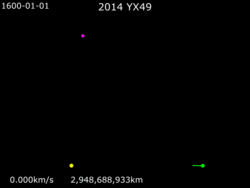Astronomy:(636872) 2014 YX49
| Discovery[1] | |
|---|---|
| Discovered by | Pan-STARRS |
| Discovery site | Haleakala Obs. |
| Discovery date | December 26, 2014 |
| Designations | |
| 2014 YX49 | |
| Minor planet category | Uranus trojan centaur[2][3] · distant[1] |
| Orbital characteristics[2] | |
| Epoch 16 February 2017 (JD 2457800.5) | |
| Uncertainty parameter 1 | |
| Observation arc | 4876 days (13.35 yr) |
| |{{{apsis}}}|helion}} | 24.4207 astronomical unit|AU (3.65328 Tm) |
| |{{{apsis}}}|helion}} | 13.8401 AU (2.07045 Tm) |
| 19.1304 AU (2.86187 Tm) | |
| Eccentricity | 0.276539 |
| Orbital period | 83.67 yr (30562 d) |
| Mean anomaly | 75.587° |
| Inclination | 25.55097° |
| Longitude of ascending node | 91.44425° |
| 280.584° | |
| Earth MOID | 12.9424 AU (1.93616 Tm) |
| Jupiter MOID | 9.47006 AU (1.416701 Tm) |
| Physical characteristics | |
| Mean diameter | 77 km (est. at 0.09)[3] |
| Apparent magnitude | 21.6 |
| Absolute magnitude (H) | 8.8 |
(636872) 2014 YX49 (provisional designation 2014 YX49) is a centaur and Uranus co-orbital, approximately 77 kilometers (48 miles) in diameter, first observed on December 26, 2014, by the Pan-STARRS survey.[4] It is the second known centaur on a tadpole orbit with Uranus, and the fourth Uranus co-orbital discovered after 83982 Crantor, 2011 QF99 and (472651) 2015 DB216.[5]
Description
Centaur 2014 YX49 is a temporary L4 trojan of Uranus, the second one (2011 QF99 was identified first) to be confirmed as currently trapped in such a resonant state. This object may have remained as a L4 Uranian Trojan for about 60,000 years and it can continue that way for another 80,000 years. Numerical integrations suggest that it may stay within Uranus' co-orbital zone for nearly one million years.[5]
Besides being a L4 Uranian trojan, 2014 YX49 is trapped in the 7:20 mean motion resonance with Saturn as well; therefore, this minor body is currently subjected to a three-body resonance.[5] The other known Uranian trojan, 2011 QF99, is also in this resonant configuration.
See also
- 2011 QF99
- 83982 Crantor
- (472651) 2015 DB216
- List of centaurs (small Solar System bodies) § 2014 YX49
References
- ↑ 1.0 1.1 "2014 YX49 - Minor Planet Center". International Astronomical Union. http://www.minorplanetcenter.net/db_search/show_object?object_id=2014+YX49&commit=Show. Retrieved 20 January 2017.
- ↑ 2.0 2.1 "JPL Small Body Database Browser". NASA. http://ssd.jpl.nasa.gov/sbdb.cgi?sstr=2014%20YX49. Retrieved 20 January 2017.
- ↑ 3.0 3.1 Johnston, Wm. Robert (18 August 2020). "List of Known Trans-Neptunian Objects". Johnston's Archive. http://www.johnstonsarchive.net/astro/tnoslist.html. Retrieved 12 August 2021.
- ↑ "MPEC 2016-O10 : 2014 YX49". International Astronomical Union. http://www.minorplanetcenter.net/mpec/K16/K16O10.html. Retrieved 20 January 2017.
- ↑ 5.0 5.1 5.2 de la Fuente Marcos, Carlos; de la Fuente Marcos, Raúl (15 May 2017). "Asteroid 2014 YX49: a large transient Trojan of Uranus". Monthly Notices of the Royal Astronomical Society 467 (2): 1561–1568. doi:10.1093/mnras/stx197. Bibcode: 2017MNRAS.467.1561D.
External links
- Far-off asteroid caught cohabiting with Uranus around the Sun
- (636872) 2014 YX49 at the JPL Small-Body Database
 |


